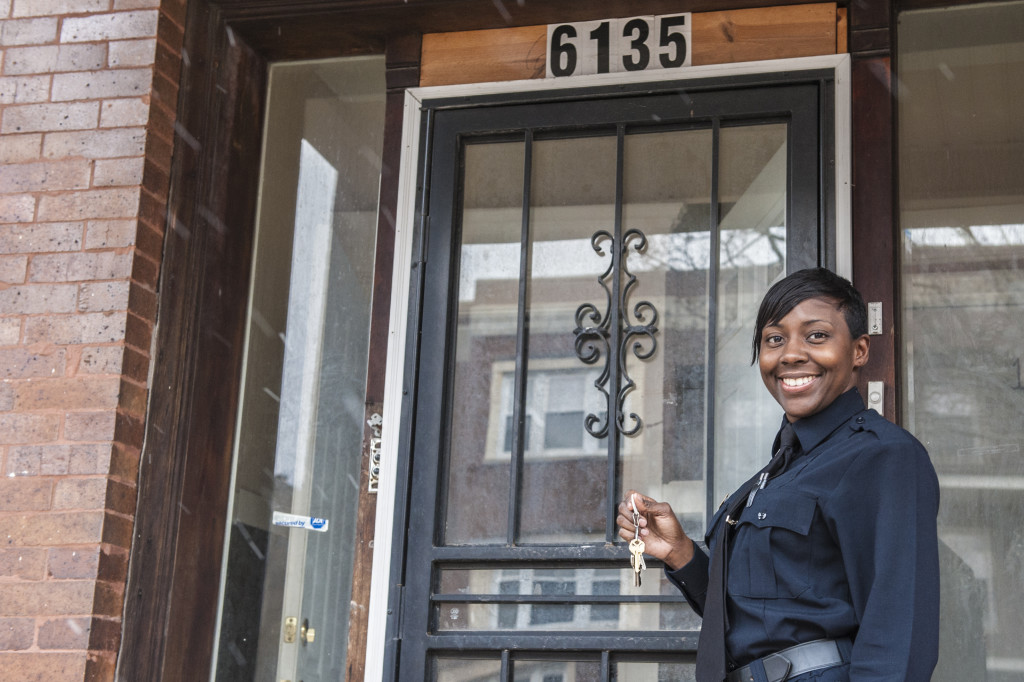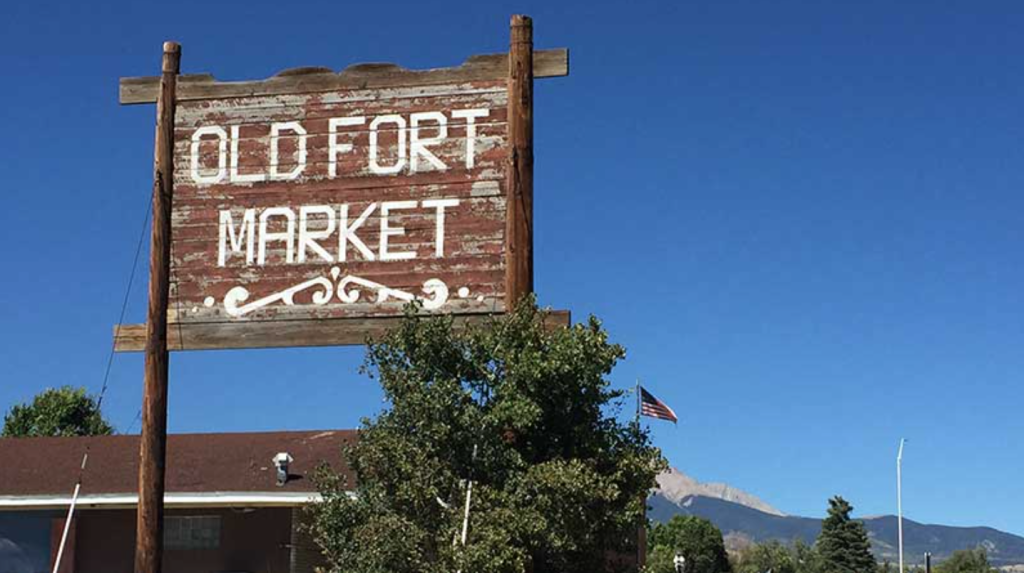
Investing in Communities
Investing in Communities
A five-year, $125 million initiative supports innovative collaborations to revitalize neighborhoods across the country.
Keona Tate saw promise, where many could not. In the south side Chicago neighborhood of Woodlawn, she was happy to find a vacant, two-family brick home within walking distance of both her job and her son’s high school. Tate purchased the property with the help of a local homebuyer assistance program and plans to live in the building’s first-floor unit while renting out the other one. She hopes to move in within a few months but, for now, she’s looking forward to fixing up the place.
“It just needs some tender love and care,” the 34-year-old University of Chicago police officer said.
The home buyer program benefiting Tate is one of many community revitalization efforts funded by PRO Neighborhoods, a $125 million, five-year initiative by JPMorgan Chase & Co. to help bring economic opportunity to distressed neighborhoods across the country.
One component of PRO Neighborhoods’ work entails commissioning research that identifies challenges facing various communities in an effort to arm local Community Development Financial Institutions (CDFIs). The CDFIs then use this knowledge to form collaboratives that will tackle those challenges.
In Chicago, that meant working to improve the crumbling housing stock in the city’s less affluent neighborhoods. The Chicago Collaborative, a partnership consisting of three CDFIs, provides financing to would-be homeowners and investors on the condition that they rehabilitate properties to meet the collaborative’s high standards.

A homebuyer assistance program offered by the Chicago Collaborative helped Keona Tate purchased her home in the Woodlawn neighborhood of Chicago. Image courtesy of JPMorgan Chase & Co.
Woodlawn, with its convenient location near the University of Chicago as well as the affluent neighborhood of Hyde Park, was a perfect target for the program, according to Jack Crane, the director of lending at Community Investment Corporation (CIC), one of the three Chicago Collaborative groups. “What you’ve had in Woodlawn is either vacant or mismanaged apartment buildings and literally hundreds of vacant or buildings in poor condition, but given its location, it really doesn’t make sense,” Crane said. “There’s a tremendous opportunity there to attract the people who work in Hyde Park and at the university.”
Using PRO Neighborhoods funds, CIC purchased 35 properties in the neighborhood with the intention of reselling them to Chicago-area residents who work nearby. Keona is one of their first homebuyers – the first, they hope, of many.
Good Food, Close to Home
While good housing is key to any vibrant community, another staple is equally important – access to food. Yet many communities qualify as “food deserts” – areas where grocery stores selling fresh, healthy produce and other essential items are hard to come by. In communities across the county, the PRO Neighborhoods-backed ReFresh is working to change that.
One of the program’s first success stories is its revitalization of Fort Market, the largest grocery store in rural Costilla County, one of Colorado’s poorest areas. For the county’s residents, the closest alternative to Fort Market is up to 60 miles away. Yet many had been making that drive because, until recently, Fort Market was on the ropes. High energy bills caused by outdated equipment left the grocery store with little capital to adequately stock its shelves. Without outside intervention, the store would have likely closed.

PRO Neighborhoods helped revitalize this grocery store, one of the few in Costilla County, Colorado. Image courtesy of JPMorgan Chase & Co.
Fortunately for Fort Market and Costilla County residents, ReFresh’s partners, The Reinvestment Fund and the Colorado Enterprise Fund, had identified the community as a prime candidate for help. The Colorado Enterprise Fund stepped in with a loan that not only stopped the store from closing but cleared the way for major improvements. Fort Market is now working to shore up its inventory to bring customers back into the fold. “They’ll be able to come and get all their shopping needs done,” said Anne Misak, Colorado Enterprise Fund’s Healthy Food Program Manager. Just as important, Fort Market is upgrading its freezer and refrigeration equipment in order to cut down on energy usage and slash its electricity bills.
While PRO Neighborhoods’ funding helped cover the loan’s underwriting and closing costs, it’s also funding staff positions – including Misak’s – that allow the CDFIs to take a hands-on approach to guiding stores like Fort Market into a self-sustaining business model.
“We can provide extra support to some of these stores and business owners who really need that extra help. We have the time to do follow up calls and follow up visits,” Misak said. “We’re really making sure they’re getting what they need to be able to grow and be successful.”
Creating Opportunities for New Entrepreneurs
When it comes to bolstering a community’s economy, however, it’s not just a matter of helping existing businesses – it’s about encouraging new ones, too. In Phoenix, Arizona, some new entrepreneurs will soon find the support they need in, of all places, a former pickle factory. The CDFI group Prestamos – part of the nonprofit organization Chicanos Por La Causa – has partnered with the National Association for Latino Community Asset Builders (NALCAB) to convert the 39,000-square foot former home of a pickle manufacturing plant into an incubator space for businesses specializing in light manufacturing.
PRO Neighborhoods will be investing $125 million over five years to help bring economic opportunity to distressed neighborhoods across the country.
The collaboratives are using funds from PRO Neighborhoods as well as a grant from the U.S. Department of Commerce’s Economic Development Administration. Noel Poyo, NALCAB’s executive director, said the incubator project is leveraging the PRO Neighborhoods funding, in particular, to attract additional investment. He noted that relying on government funding, which often requires a long approval period, can slow a project down and discourage potential investors. “Flexible capital in a deal is the glue that sticks everything together,” Poyo said. “That’s exactly what the JPMorgan Chase money was used for.”
The new entrepreneurs who join the space will also be provided loans, access to manufacturing equipment and training on how to use that equipment. Up to 30 businesses may someday call the facility home, potentially creating more than 200 local jobs.
Jose Martinez, the president of Prestamos, said that one new business likely to join the incubator space is a manufacturer that makes soaps specially designed for nail salons. What other businesses will take up residence in the old pickle factory will be determined later this year, when the building, which is currently undergoing extensive renovations, reopens its doors. Martinez already envisions great things on the horizon.
“There’s a beauty to bringing a number of entrepreneurs with creative minds together to work with each other and create something new,” he said. “We’re just excited about the potential.”
Daryl Shore is a Vice President and Program Officer of Community Development in Global Philanthropy at JPMorgan Chase & Co.
An earlier version of this piece appeared on JPMC.com.
Project
PRO Neighborhoods
Philanthropy
JPMorgan Chase & Co.


